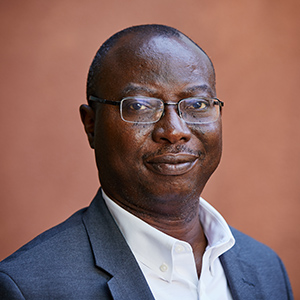The International HapMap Project was an organization that aimed to develop a haplotype map (HapMap) of the human genome, to describe the common patterns of human genetic variation. HapMap is used to find genetic variants affecting health, disease and responses to drugs and environmental factors. The information produced by the project is made freely available for research.

David Haussler is an American bioinformatician known for his work leading the team that assembled the first human genome sequence in the race to complete the Human Genome Project and subsequently for comparative genome analysis that deepens understanding the molecular function and evolution of the genome.

Francis Sellers Collins is an American physician-geneticist who discovered the genes associated with a number of diseases and led the Human Genome Project. He served as director of the National Institutes of Health (NIH) in Bethesda, Maryland, from 17 August 2009 to 19 December 2021, serving under three presidents.
Himla (Himladevi) Soodyall is a South African geneticist involved in finding some of the oldest human genetic lines, mainly focusing on Sub-Saharan Africa. Her work on DNA has pointed to southern Africa as the most likely geographic region of origin of the human species.

Eric D. Green is an American genomics researcher who had significant involvement in the Human Genome Project. He is the director of the National Human Genome Research Institute (NHGRI) at the National Institutes of Health (NIH), a position he has held since 2009.
The PhenX Toolkit is a web-based catalog of high-priority measures related to complex diseases, phenotypic traits and environmental exposures. These measures were selected by working groups of experts using a consensus process. PhenX Toolkit's mission is to provide investigators with standard measurement protocols for use in genomic, epidemiologic, clinical and translational research. Use of PhenX measures facilitates combining data from a variety of studies, and makes it easy for investigators to expand a study design beyond the primary research focus. The Toolkit is funded by the National Human Genome Research Institute (NHGRI) of the National Institutes of Health (NIH) with co-funding by the Office of the Director (OD), the National Institute of Neurological Disorders and Stroke (NINDS), and the National Heart, Lung, and Blood Institute (NHLBI). Continuously funded since 2007, PhenX has received funding from a variety of NIH institutes, including the National Institute on Drug Abuse (NIDA), the National Institute on Mental Health (NIMH), the National Cancer Institute (NCI) and the National Institute on Minority Health and Health Disparities (NIMHD). The PhenX Toolkit is available to the scientific community at no cost.

Elaine Ann Ostrander is an American geneticist at the National Human Genome Research Institute (NHGRI) of the National Institutes of Health (NIH) in Bethesda, Maryland. She holds a number of professional academic appointments, currently serving as Distinguished and Senior Investigator and head of the NHGRI Section of Comparative Genomics; and Chief of the Cancer Genetics and Comparative Genomics Branch. She is known for her research on prostate cancer susceptibility in humans and for conducting genetic investigations with the Canis familiaris —the domestic dog— model, which she has used to study disease susceptibility and frequency and other aspects of natural variation across mammals. In 2007, her laboratory showed that much of the variation in body size of domestic dogs is due to sequence changes in a single gene encoding a growth-promoting protein.
Genetic privacy involves the concept of personal privacy concerning the storing, repurposing, provision to third parties, and displaying of information pertaining to one's genetic information. This concept also encompasses privacy regarding the ability to identify specific individuals by their genetic sequence, and the potential to gain information on specific characteristics about that person via portions of their genetic information, such as their propensity for specific diseases or their immediate or distant ancestry.

Manolis Kellis is a professor of Computer Science at the Massachusetts Institute of Technology (MIT) in the area of Computational Biology and a member of the Broad Institute of MIT and Harvard. He is the head of the Computational Biology Group at MIT and is a Principal Investigator in the Computer Science and Artificial Intelligence Lab (CSAIL) at MIT.

Emmanouil Theophilos Dermitzakis is a Greek human geneticist and professor in the Department of Genetic Medicine and Development at the University of Geneva, where he is also Director of the Health 2030 Genome Center. He is an ISI Highly Cited Researcher and an elected member of the European Molecular Biology Organization. He is a member of the Swiss Institute of Bioinformatics, where his research group is focused on the genetics and genomics of complex traits in humans. He has joined GlaxoSmithKline as Vice President, Computational Biology in R&D.
Charmaine DM Royal is an American geneticist and Associate Professor at the Institute for Genome Sciences & Policy and the Department of African and African American Studies at Duke University. She studies the intersections of race, ethnicity, ancestry genetics, and health, especially as they pertain to historically marginalized and underrepresented groups in genetic and genomic research; and genomics and global health. Her major interest is in addressing root causes and implementing sustainable solutions regarding problems of race and racism in research, healthcare, and society. Royal is a Human Heredity and Health in Africa (H3Africa) Independent Expert Committee (IEC) member appointed by the National Institutes of Health (NIH) and is a 2020 Ida Cordelia Beam Distinguished Visiting Professor at the University of Iowa.
Human Heredity and Health in Africa, or H3Africa, is an initiative to study the genomics and medical genetics of African people. Its goals are to build the continent's research infrastructure, train researchers and clinicians, and to study questions of scientific and medical interest to Africans. The H3Africa Consortium was formally launched in 2012 in Addis Ababa and has grown to include research projects across 32 countries, a pan-contintental bioinformatics network, and the first whole genome sequencing of many African ethnolinguistic groups.

Neil Hanchard is a Jamaican physician and scientist who is clinical investigator in the National Human Genome Research Institute (NHGRI), where he leads the Childhood Complex Disease Genomics section. Prior to joining NHGRI, he was an associate professor of molecular and human genetics at the Baylor College of Medicine. He is a fellow of the American College of Medical Genetics and Genomics,. Hanchard's research focuses on the genetics of childhood disease, with an emphasis on diseases impacting global health.

Vence L. Bonham Jr., J.D. is the acting Deputy Director of the National Human Genome Research Institute (NHGRI) of the U. S. National Institutes of Health, and is the leader of the NHGRI Health Disparities Unit. His research focuses on social determinants of health, particularly with regard to the social implications of new genomic knowledge and technologies.

The African Society of Human Genetics (AfSHG) is a learned society and professional membership organization focused on the study of human genetics and genomics in Africans, and open to researchers who are interested in the subject. It has played a role in founding several national genetics societies, and is affiliated with the societies of Cameroon, the Democratic Republic of the Congo, Mali, Egypt, Rwanda, Senegal, South Africa, and Tanzania.

Tara Matise is an American geneticist at Rutgers University. Since 2018, she has served as chair of the Department of Genetics. Her research interests span computational genetics, data science, and human genetics. She is co-director of the Rutgers University Genetics Coordinating Center.

Wylie Burke is a Professor Emerita and former Chair of the Department of Bioethics and Humanities at the University of Washington and a founding co-director of the Northwest-Alaska Pharmacogenomics Research Network, which partners with underserved populations in the Pacific Northwest and Alaska.

Adebowale A. Adeyemo is a Nigerian physician-scientist and genetic epidemiologist specialized in genomics and cardiometabolic disorders. He is the deputy director and chief scientific officer of the Center for Research on Genomics and Global Health at the National Human Genome Research Institute.












